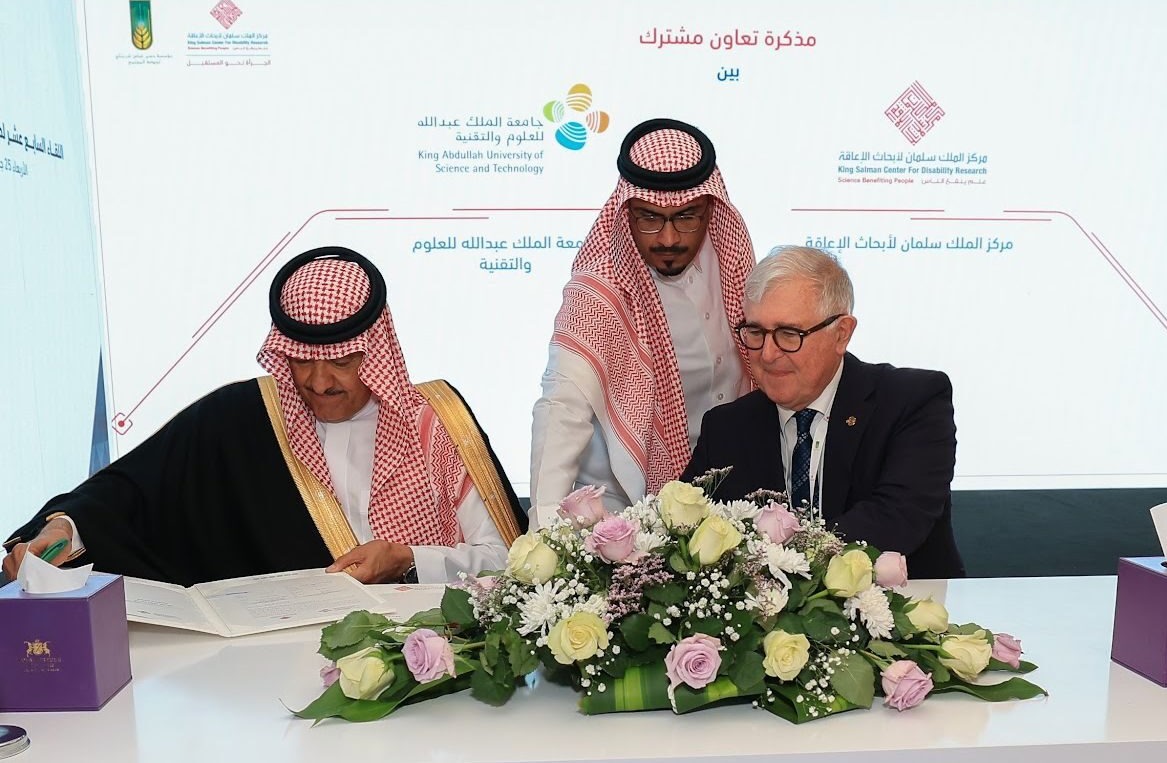KAUST and King Salman Center for Disability Research sign research agreement

His High Royal Highness Prince Sultan bin Salman and KAUST President, Professor Sir Edward Byrne signing the agreement.
As part of its ongoing commitment to support Health and Wellness in the Kingdom, King Abdullah University of Science and Technology (KAUST) has signed a memorandum of understanding (MoU) with KSCDR to combine their strengths in the diagnosis, management and treatment of disabilities affecting Saudi citizens and residents.
Signing the MoU were KSCDR Chairman, his High Royal Highness Prince Sultan bin Salman and KAUST President, Professor Sir Edward Byrne.
“The partnership between KAUST and KSCDR provides a unique opportunity for our Center of Excellence for Smart Health to put our world-class research capability towards finding practicable solutions that benefit Saudis, especially those affected by disabilities. I feel privileged and honored to be part of this partnership and working with KSCDR scientists and leaders to improve the quality of life of people with disabilities in Saudi Arabia and beyond.,” said Professor Imed Gallouzi, Chair of KAUST’s Center of Excellence for Smart Health.
As KSCDR approaches their new strategy for research and innovation in 2025, this partnership aims to promote knowledge sharing and the targeting of specific disabilities where KAUST and KSCDR can together make an impact, including neurodevelopmental conditions and learning disabilities, visual impairments, speech disorders, and mobility impairments. This partnership aims to find solutions to the growing prevalence of chronic diseases and disabilities in the Kingdom and the region, including conditions stemming from genetic causes.
“To best serve people with disabilities, we need new discoveries and innovations that can be translated to better care. Through this agreement, KAUST is supporting our goals,” said KSCDR CEO, Dr. Badr Al-Hajhouj.
The health of the Saudi population has undergone a remarkable transformation since the middle of the 20th century, with life expectancy in the Kingdom increasing from 41 years in 1950 to 77 years in 2021. Yet these incredible gains have been countered by the rising incidence of chronic diseases and disabilities that seriously affect quality of life.
On July 1 2024, KAUST launched its Center of Excellence for Smart Health, which specializes in the use of smart and digital technologies for precision and personalized medicine. Chaired and co-chaired by Professors Imed Gallouzi and Xin Gao, respectively, the center includes 43 KAUST faculty and leverages the region’s fastest supercomputer as well as advanced genome sequencing instrumentation.
Aligned with the national priorities of the Kingdom in Research, Development and Innovation, KAUST is using its world-class scientific output to generate impact. In 2023, Associate Professor Matteo Parsani completed an unprecedented journey across the Kingdom by hand-cycling over 3,000 km in 30 days, while being actively monitored by a suite of cutting-edge wearable sensing devices, developed by his KAUST colleagues.
At the same time, Saudi Arabia’s Vision 2030 has pledged to improve the lives of the disabled by providing education and job opportunities that ensure a higher quality of life for these people and their greater contribution to society.

